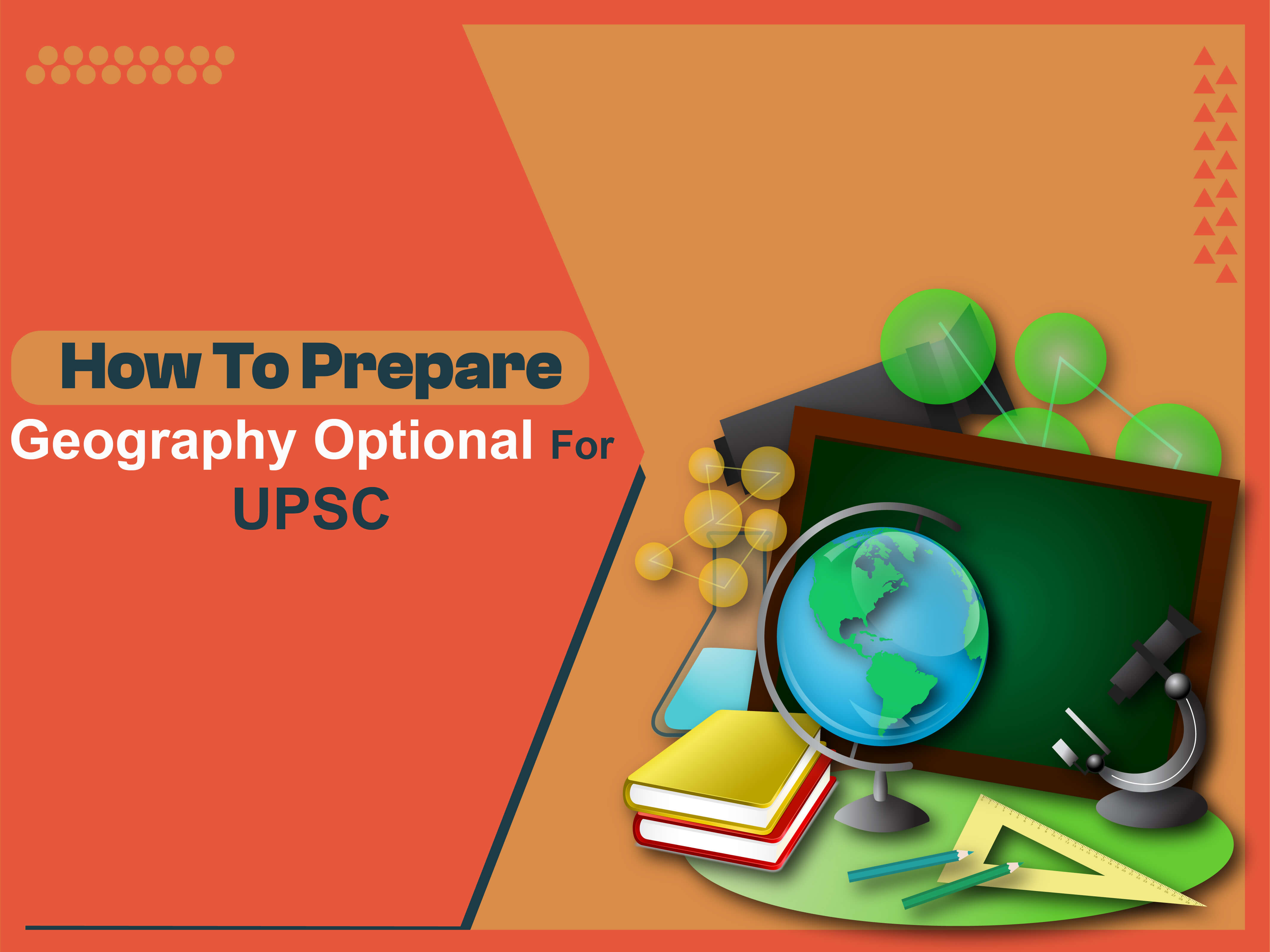
How to Prepare Geography Optional for UPSC
Preparing for Geography optional as an optional topic is a hard journey. But an easy, well-planned plan can be of great use. Geography is not only fun; it’s also rewarding. This is a comprehensive guide to help you prepare for Geography optional in simple and easy-to-understand terms, breaking the steps down into small portions.
- 1
Gather the Right Study Material:
First, gather the right study material. Go for ordinary textbooks which cover the whole syllabus in thorough detail. Among the recommended books are Goh Cheng Leong’s Certificate in Physical and Human Geography and Majid Husain’s Geography of India. They are written in simple language, making it clearer for beginners to understand.
- 2
Create a Realistic Study Schedule:
Time management is crucial. Set aside time for different topics in a study schedule. You’ll always be better off if you try to maintain consistency instead of cramming. What’s more, both physical and human geography must be studied in a slow, steady manner.
- 3
Start with Basics:
You should prepare yourself by reviewing the foundations. Grasp basic concepts such as latitude, longitude, climate, and topography. Understanding advanced topics requires a firm grasp of the basics.
- 4
Focus on Physical Geography:
The syllabus includes a large segment on physical geography. Allocate adequate time to subjects such as geomorphology, climatology, and oceanography. Maps and diagrams are especially suited for illustrating concepts in physical geography.
- 5
Dive into Human Geography:
Population, agriculture, and urbanisation are all part of human geography. Take a practical view when discussing these topics. Link concepts with current events and appreciate the geographical dimensions of social and economic phenomena.
- 6
Practice Map Reading:
Map-reading skills are essential to geography. Practice regularly in marking and identifying locations on maps. This not only helps you remember, but it also increases your skill in visualising geographical features.
- 7
Refer to Previous Year Question Papers:
UPSC often adopts a common pattern in its exams. To get a handle on the kinds of questions asked and the level of knowledge expected, look through last year’s question papers. Thus, it helps you tailor your preparation for UPSC exam.
- 8
Stay Updated with Current Affairs:
Geography is living and inseparable from contemporary news. Keep informed about world and national developments, especially those with a geographic emphasis. Combine geographical concepts with contemporary issues for a full understanding.
- 9
Join Study Groups:
You may want to consider getting together with fellow aspirants for study groups. In group discussions, questions can be asked from different angles, and doubts can be resolved. Teaching concepts to the others in your group strengthens understanding on both sides.
- 10
Incorporate Visual Learning Tools:
Geography includes much of the visual. You may also use videos, documentaries, or tutorials found on the Internet to amplify your reading. Geographical processes and phenomena can be made clearer with visual aids.
- 11
Effective Note-Taking:
Design a note-taking system that is effective. Highlight important points, use bullet points and mind maps. These notes will be used as quick references during revision.
- 12
Regularly Test Your Knowledge:
Why not play some quizzes and use some self-assessment tools to test your knowledge for a bit of fun? It not only reinforces what you’ve already learned but is also an indicator pointing to where attention should be paid. Quizzes on geographical topics are often found on online platforms.
- 13
Stay Positive and Consistent:
Geography is a broad field, and it’s natural to sometimes feel overwhelmed. Stay positive and realise that only consistency counts. Divide the syllabus into smaller portions. Rewarding yourself for small victories can keep you going.
- 14
Seeking Guidance from Teachers:
If possible, consult teachers or specialists in Geography. They can also give perspective, clear up doubts, and even provide a few tips on facing the UPSC Geography optional paper.
- 15
Utilise Online Resources:
Use online resources and platforms to your advantage. A number of useful sources of information are offered by the Geological Survey of India and the National Remote Sensing Centre online. People can exchange ideas or seek guidance using online forums.
- 16
Revise Strategically:
For retention, revision is essential. Revise wisely, studying both physical and human geography. To reinforce your understanding, use flashcards and review the important concepts in these notes.
- 17
Deepen Understanding through Case Studies:
Case studies can enhance your geographical knowledge. Study actual cases connected with environmental issues, urban planning, and regional development. Case studies not only add depth to your answers, but they also provide a practical understanding of geographical concepts in real life.
- 18
Understand Geopolitical Dynamics:
Geography is intertwined with geopolitics. Know the regional geopolitics: border disputes, strategic locations, and international relations. These facts add weight to your answers, especially when facing questions on international affairs.
- 19
Link Economic Geography with Current Economic Trends:
It includes topics like agriculture, industry, and trade. Apply these concepts to contemporary economic developments and policies. Studying the economic geography of a region involves examining its resources, industries, and trade.
- 20
Enhance Writing Skills for Descriptive Answers:
Cultivate your descriptive writing skills because the UPSC exam requires concise but fluent and well-organised answers. Practice saying your thoughts clearly and concisely. Write your answers in plain language and order them logically so as to leave a favourable impression on the evaluator.
- 21
Create Mind Maps for Conceptual Clarity:
Mind maps provide a visual organisation of information and relationships between different geographical concepts. The mind map is a powerful tool for condensing large quantities of information and making rapid revisions.
- 22
Stay Inquisitive about Environmental Issues:
Geography and environmental matters often intersect. Always keep abreast of environmental problems, climate change, and conservation efforts. Once you understand the geographical dimensions of environmental issues, then you can better analyse and suggest solutions.
- 23
Interconnect Physical and Human Geography:
Understand the interrelation of physical and human geography. Such as, say, how climatic conditions affect agriculture or urbanisation affects land use. Combining these facets gives a comprehensive view of the geographical processes.
- 24
Use Mock Tests for Exam Simulation:
Put mock tests into your preparation regimen. They imitate exam conditions. You can practice managing time and assess how ready you are by taking mock tests. After you take mock tests, consider your own weak points and revise your exam strategy accordingly.
- 25
Use of Geographical Information System (GIS):
Learn about the various GIS tools. Know how they can be used in geographical analysis. Knowing GIS can help one interpret spatial data, map trends, and express information in graphic form.
- 26
Study Geographical Statistics:
Pay attention to statistical data about geographical phenomena. Answering questions in the exam often requires an interpretation of statistical information. Make your answers concrete and persuasive by learning to analyse geographical data.
- 27
Stay Mindful of Syllabus Weightage:
According to the weightings assigned in the syllabus, rank your topics. Because some topics are more heavily graded than others, allocate time and concentration accordingly. Make sure that you cover all relevant areas in a balanced way.
- 28
Engage in Geographical Debates:
Attend or listen to geographical debates and discussions. This can be accomplished through online forums, seminars, or discussions with friends. Participating in debates develops one’s powers of analysis and furnishes different perspectives.
- 29
Utilise Educational Apps for Interactive Learning:
To learn more about geography, browse educational apps that provide hands-on learning. They may be quizzes, interactive maps, or other interesting material which you can use to enrich your traditional sources.
- 30
Incorporate Sustainable Development Perspectives:
Know the geographic characteristics of sustainable development. It is imperative to link concepts. Here, the United Nations Sustainable Development Goals – the SDGs come into being. Discussing how geography can help nations achieve harmonious relationships between development and environmental conservation is what will actually help.
Conclusion:
Beyond bookish reading: Preparation for the UPSC optional in Geography is not so black and white. If you add these extra approaches to your study schedule, it will help you grasp the details and develop critical judgement. This way, any topic can come up on test day without worry. Always keep in mind these three qualities: Simplicity, Curiosity, and Mindful approach to the syllabus. These are key steps for succeeding in Geography (for UPSC).






